Crew Photos – November 20th
Journalist Report – November 20th
Sol 08 Journalist Report 20-NOV-2023
Last night Crew Inventor Scott Beibin (Ptelepathetique) performed an original music composition inside the Science Dome to demonstrate the way sound travels on through the Martian atmosphere.
This morning the crew rose before dawn, excited for the early morning’s adventure: an outdoor Ptelepathetique concert just after the glorious Martian sunrise.
It was also the most ambitious EVA our crew had enacted yet. Because this EVA included six people in sim suits and helmets, all carrying cameras, synthesizers, recording equipment and other gear, we used the RAM as a large airlock for the depressurization sequence and exit. This EVA also functioned as a practice scenario of an evacuation or a group migration to a new lander that has arrived nearby.
The RAM was the perfect size for our crew. Scott, Liz Cole (Crew Journalist), Hugo Saugier (Crew Documentary Filmmaker), Guillaume Gégo, Roger Gilbertson and Caleb Stein exited with no helmet bumping and then walked to an area by the science dome.
Don got us suited up quickly and we walked to the RAM, carrying our helmets in their cases, donned helmets in the RAM, performed a five-minute depressurization, and greeted the frosty sunny morning.
We walked to the beautiful red hills just north of the Observatory, where Scott performed another concert demonstrating the acoustics of Mars, this time for astronauts in sim suits. Scott Beibin collaborated with audio engineer John Knott to create a filter in a DAW (Digital Audio Workstation) that simulates the way sound travels in the low-pressure CO2-dominated atmosphere of Mars, using data collected by the Perseverance Rover.
Later that morning, Liz captured NERFs of some geological features near the MDRS habitat.
In the Science Dome Guillaume sampled the prolific spirulina growth from Cécile Renauld’s (MDRS 261 scientist and PhD candidate at University of Mons) spirulina bioreactor.
Scott captured a LiDAR scan of the interior of the MASH. The MASH (Mobile Analog Space Habitat) is a converted mobile habitat with heating, cooling, food and water supply, and waste handling, designed and built by Donald Jacques, MDRS Crew 286 Executive Officer and Chief Scientist at Earthseed.
Crew Photos – November 18th
Supplemental Operations Report – November 19th
Date: 11/19/2023
Name of person filing report: Sergii Iakymov
Reason for Report: Routine
Non-Nominal Systems: A tunnel stick on the right from the rear airlock. Director’s trailer heater.
Power system:
Solar: Nominal.
SOC Last 24 hours: Max 100%; Min 63%; Avg 74.5%.
VDC Last 24 hours: Max 59.01V; Min 43.63V; Avg 48.61V.
Generator run time: 4048.8 hours.
Propane Readings:
Station Tank: 70%
Director Tank: 70%
Intern Tank: 71%
Generator Tank: 51%
Water:
Hab Static Tank – 275.5 gallons
GreenHab – 171 gallons
Outpost tank – 430 gallons
Science Dome – 0 gallons
Hab Toilet Tank emptied: No
Rovers:
Sojourner rover used: Yes, around the station.
Hours: 195.7
Beginning Charge: 100 %
Ending Charge: 100 %
Currently Charging: Yes
Notes on Rovers: All rovers serviced and damaged fuse terminals replaced. All EVA rovers got equipped with rear view mirrors.
ATV: ATV’s Used: None. Nothing to report.
Cars:
Hab Car used and why, where: To Hanksville for supplies. Need to be serviced.
Crew Car used and why, where: To Hanksville for supplies.
General notes and comments: All cars awaiting renewed insurance ID.
Summary of Internet: All nominal.
EVA suits and radios:
Suits: All nominal
Comms: All nominal
Campus wide inspection, if action taken, what and why: One tunnel stick on the right from the rear airlock is corroded out at the ground level and needs to be replaced. Repair is scheduled to be done by the end of next week.
Summary of Hab Operations: Nothing to report
Summary of GreenHab Operations: All nominal
Summary of SciDome Operations: All nominal
Summary of Observatories Operations: All nominal.
Summary of RAM Operations: All nominal.
Summary of Outpost Operations: Director’s trailer heater is non operational. New heater will be ordered next week.
Summary of Health and Safety Issues: All nominal.
Journalist Report – November 18th
Journalist Report 18-11-2023 Crew 286 by Liz Cole and Scott Beibin
SOL: 6
An Unintentionally Wet Dress Rehearsal
Morning:
The booster experienced a rapid unscheduled disassembly shortly after stage separation while Starship’s engines fired for several minutes on its way to space
Most of the crew awoke early this morning to watch the successful launch attempt of the second orbital test flight of the fully stacked SpaceX’s ‘Starship Super Heavy’ rocket. The launch resulted in a successful full firing of all engines on both stages – 33 of the Raptor Engines on the Super Heavy Booster 9 and all 6 Raptor Engines on Starship 25 (3 Sea Level and 3 Vacuum Raptor Engines). The Super Heavy Booster and Starship successfully separated after liftoff. During the separation Starship ignited its engines and pushed away. SpaceX stated in a post after the launch that “The booster experienced a rapid unscheduled disassembly shortly after stage separation while Starship’s engines fired for several minutes on its way to space”.
‘Starship Super Heavy’ is the tallest and most powerful rocket ever built by humans. It’s designed to carry large payloads and human crews offworld to the Moon, Mars and beyond. It went further than its predecessor went during its first test flight on April 20, 2023 and can be viewed both as a success and learning opportunity, enabling future opportunities in order to test the system.
Back at Mars Desert Research Station in Utah, Crew 286 engaged in excited breakfast discussions about the progress and learning opportunities from the launch – which carried over into conversations about the terrestrial applications of space research. Guillaume Gégo, MDRS Crew Scientist discussed the benefits of space program research which extends to improving life on Earth, especially in terms of solving global problems of hunger. The purple bacteria currently being grown in his experiment includes the efficient production of necessary nutrients that are not easily accessible to many people on Earth – which is of paramount importance. Additionally discussed were the benefits of space simulations which can be naturally inspiring to kids who dream of becoming astronauts.
Afterwards, planning went into full swing for the afternoon’s EVA.
Afternoon:
The scheduled EVA intended to involve Scott Beibin (crew Artist/Inventor) performing exterior 3D LiDAR scanning of the Mars Desert Research Station complex, including all the structures at the facility, as well as reconnaissance for optimal locations for Scott’s Ptelepathetique ‘Martian Music’ concert scheduled to take place on Sol 7 (November 19), and photography by Andrea Orejarena and Caleb Stein (an artist duo shooting for the New York Times) of personal mementos brought by each astronaut if they were to spend years away from Earth. The EVA was to be filmed by Hugo Saugier, MDRS 286 crew member and documentary filmmaker.
As the four analog astronaut crew members began to exit the airlock, it began to rain, quickly turning the campus into a muddy and slippery red clay mess. The astronauts returned to the airlock to wait it out, however, as the rain poured down with increasing intensity, it became clear that the crew would not be safe traversing in the slippery conditions, and the delicate equipment including LiDAR scanning devices, camera gear, synthesizers, audio gear would not be safe in the rain. After a few more minutes Mission Support stated that weather radar showed rain likely to continue for the duration of the EVA. The crew quickly came to consensus that it was best to abort the mission. I joked that the mission had become a “wet dress rehearsal”.
They re-pressurized in the airlock and returned to the HAB.
The remainder of Scott’s afternoon was spent continuing to perfect detailed plans for his outdoor concert, including a manifest and review of the hardware and processes he will be incorporating into his performance.
In the GreenHab, several of the microgreens have sprouted. Guillaume’s progress with his purple bacteria continued as normal. In the RAM, Roger Gilbertson, Crew Commander, used the oven to dry the first half of the plaster casting mold.
Evening:
Roger, Scott, Hugo and Liz explored logistics, communications, and audio configurations for the seven – person EVA required for the Ptelepathetique concert simulating the acoustics of Mars.
GreenHab Report – November 18th
Crew 286 GreenHab Report 18-11-2023
SOL: 6
GreenHab Officer: Donald "Duckie" Jacques
Environmental control: heater on, fan off, door closed
Average temperatures: 76 F at 9 am, 106 F at 1:30 pm, 65 F at 5 pm
Hours of supplemental light: 0
Daily water usage for crops: 4 gallons
Daily water usage for research and/or other purposes: 0
Water in Blue Tank (200 gallon capacity): 171 gallons
Time(s) of watering for crops: 1:30 pm
Changes to crops: None
Narrative: Basil, cress, red cabbage, radish, kale, and arugula in grey Planter have sprouted. Parsley, cilantro, broccoli, radish, red cabbage, pea shoots, and sunflower in big blue bin have sprouted. Broccoli in black pot has sprouted.
Harvest: Not at this time
Support/supplies needed: None
Operations Report – November 18th
Crew 286 Operations Report 18-11-2023
SOL: 6
Name of person filing report: Donald "Duckie" Jacques
Non-nominal systems: None
Notes on non-nominal systems: N/A
ROVERS
Spirit rover used: No
Hours: (before EVA)
Beginning charge: (Before EVA)
Ending charge: (On return from EVA, before recharging)
Currently charging: Yes
Opportunity rover used: No
Hours:
Beginning charge:
Ending charge:
Currently charging:Yes
Curiosity rover used: No
Hours:
Beginning charge:
Ending charge:
Currently charging: Yes
Perseverance rover used: No
Hours:
Beginning charge:
Ending charge:
Currently charging: Yes
General notes on rovers: Nothing to report
Summary of Hab operations:
WATER USE: 52.2 gallons
Water (static tank): 275.5 gallons
Static tank pipe heater (on or off): On
Static tank heater (On or off) On
Toilet tank emptied: No
Summary of internet: Nominal
Summary of suits and radios: Nominal
Summary of GreenHab operations: Watered lightly in the afternoon, noted several of the microgreens have sprouted.
WATER USE: 4 gallons
Heater: On
Supplemental light: Off
Harvest: No Harvest at this time
Summary of Science Dome operations: Guillaume continued his work with the purple bacteria.
Dual split: Heat or AC, Off
Summary of RAM operations: (Tools used, work done) Roger continued work on his mold for casting
Summary of any observatory issues: Nothing to report
Summary of health and safety issues: Nothing to report
Questions, concerns and requests to Mission Support: none
EVA Report – November 18th
Crew 286 EVA #6 report 18-NOV-2023
EVA # 6
Author: Roger Gilbertson
Purpose of EVA: To perform LIDAR scanning in the vicinity of the Habitat, west of Cow Dung Road, looking at possible locations for a Martian music performance at a later time. Also, the visiting photographers will take images of the LIDAR walkers, as well as photos of some “personal mementos” placed on the martian surface in the vicinity of the Observatory dome.
Start time for EVA: 2:50 pm
End time for EVA: 3:06 pm
Narrative: Preparations for EVA included a significant amount of equipment to be carried by all participants, so the walk began 20 minutes late at 2:50 PM. However, as they opened the exterior airlock door and began their egress, drops of rain were noticed. The rate increased a few moments later, and they returned to the airlock for the safety of their camera and electronic equipment. We watched the terrain grow increasingly wet, and Mission Support stated that weather radar showed rain likely to continue for the duration of the EVA. After a few more minutes the crew agreed to abort. We repressurized and the inner door opened about 3:06 PM.
In retrospect, it was good that the airlock egress time was delayed, otherwise the crew would have been much further from the habitat when the rain started, making their return much more difficult and treacherous.
Destination: Habitat campus only
EVA Participants:
• Scott Beibin
• Hugo Saugier
• Andrea Orejarena
• Caleb Stein
Road(s) and routes per MDRS Map: none
Mode of travel: none
Vehicles used: none
Sol Summary – November 18th
Crew 286 Sol 06 Summary Report 18-NOV-2023
Sol: 06
Summary Title: “Red, Red Rain.”
Author’s name: Roger Gilbertson
Mission Status: Nominal
Sol Activity Summary: We started the morning by watching the exciting and successful Starship launch from Earth. In the science dome our purple bacteria continue their excellent growth, as confirmed by samples which were taken and processed. The first half of the plaster mold was placed into an oven in the Science Dome for drying. Mid-mission reports are being prepared.
Today’s scheduled EVA-6 started about 20 minutes late, but as the four crew members exited the airlock door, drops of rain were noted. The rain increased a few moments later, and the crew returned to the airlock for the safety of their camera and electronic equipment. We watched the terrain grow increasingly wet, and Mission Support stated that weather radar showed that the rain was likely to continue for the duration of the EVA. After a few more minutes the crew agreed to abort and reschedule.
Look Ahead Plan: The science program will continue to monitor growth. Plaster mold preparation will continue, as will processing of LIDAR scans, photography and videography. EVA proposals are uncertain due to the now-muddy exterior conditions. Mid-mission reports will be delivered.
Anomalies in work: none
Weather: cloudy in AM, rain in afternoon
Crew Physical Status: nominal
EVA: EVA 6 completed, request for EVA 7 and EVA 8 submitted for tomorrow
Reports to be filed: Sol Summary, Journalist report, Photos, Operations report, Green Hab report, EVA 6 Summary, EVA 7 Request, EVA 8 Request.
Support Requested: none
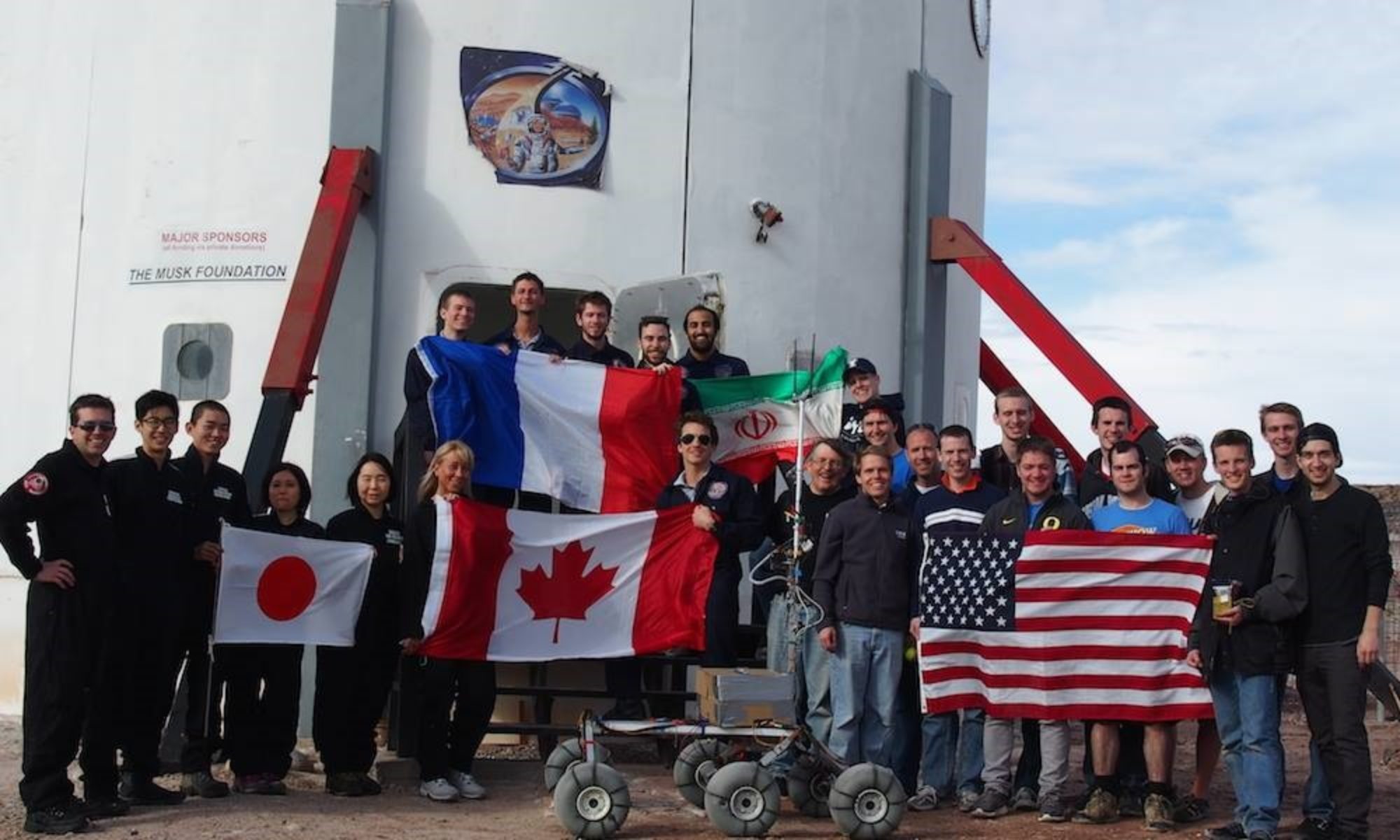
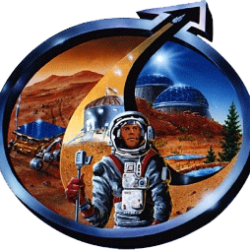
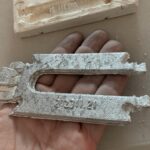
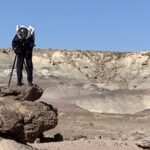
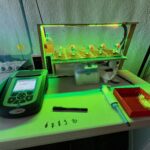
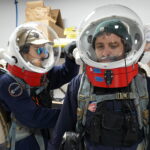
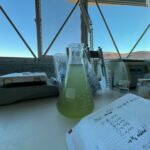
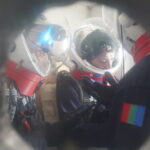
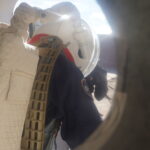
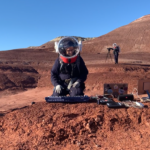
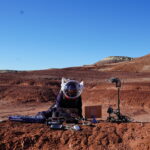
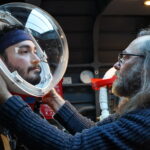
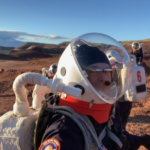
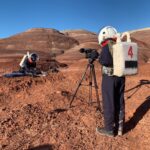
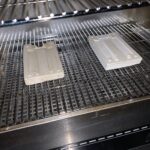

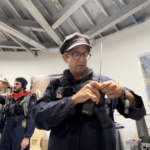
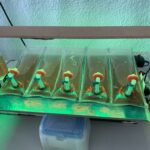
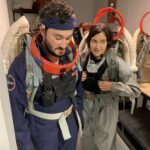
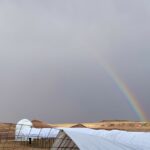

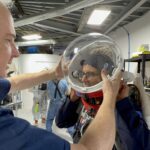
You must be logged in to post a comment.